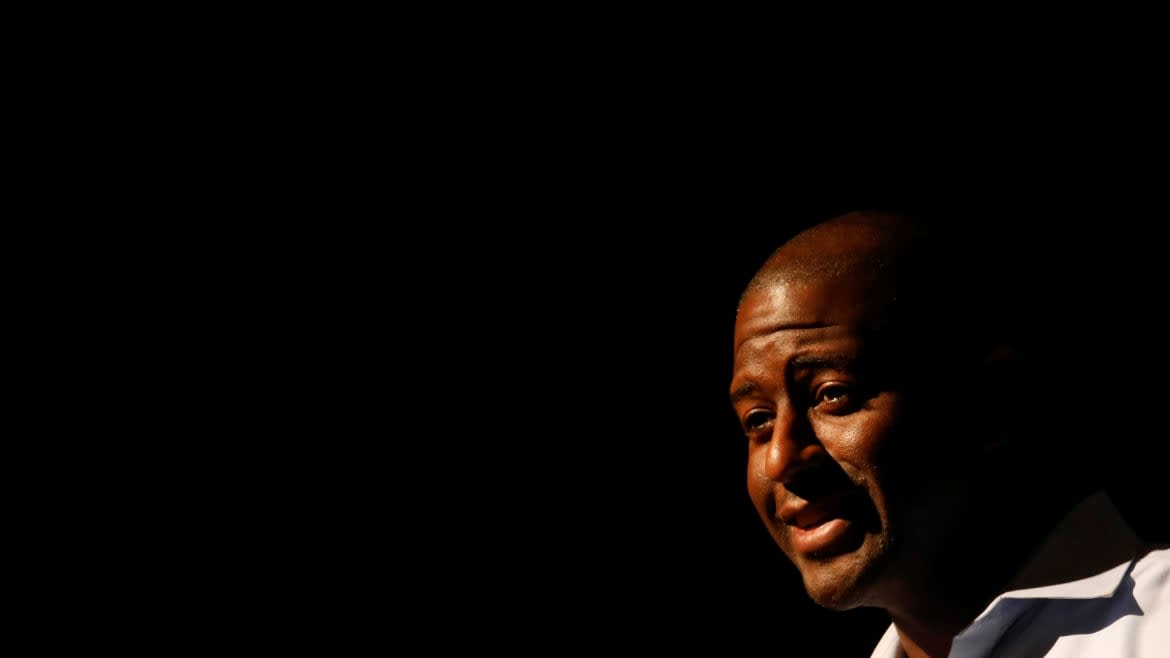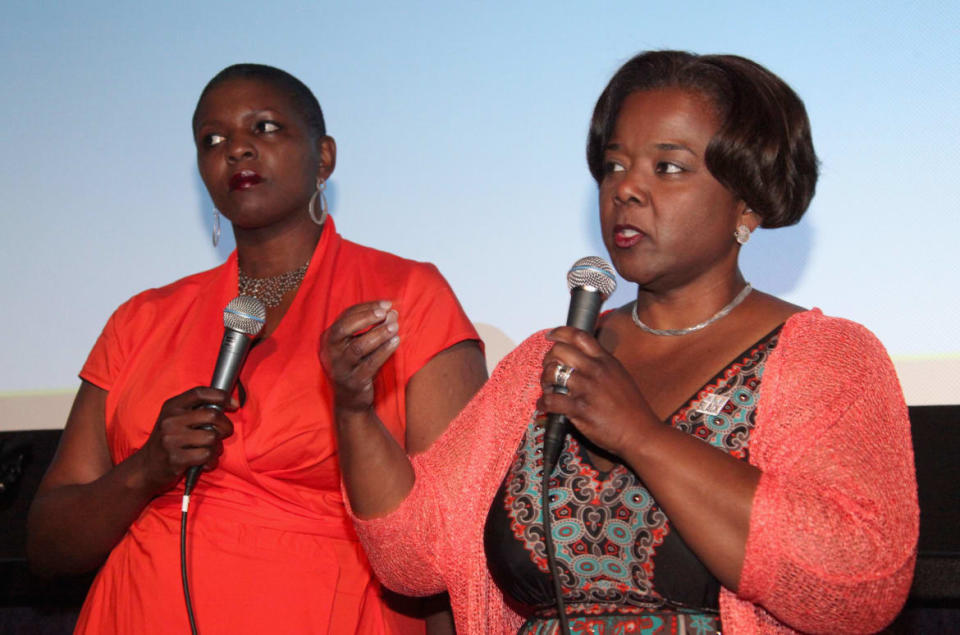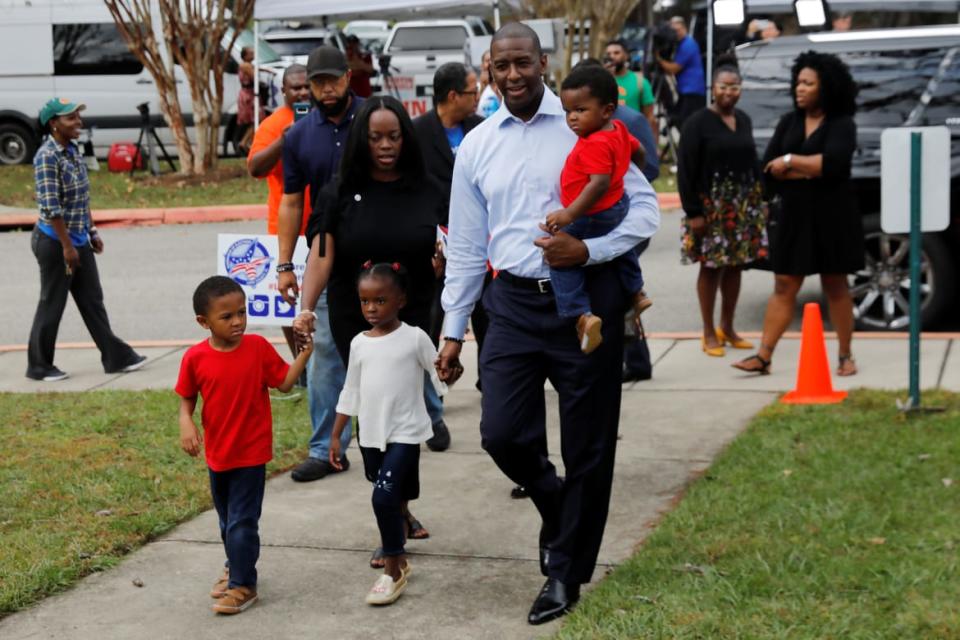Andrew Gillum’s Corruption Trial Ends in a Hung Jury

- Oops!Something went wrong.Please try again later.
A Florida jury said Thursday it’s deadlocked on whether Andrew Gillum should be convicted on public corruption charges, leaving the fate of the once rising-star of the Democratic Party in limbo.
The jury’s decision came after a nine-day trial at a federal courthouse in Tallahassee for both Gillum and his longtime mentor, Sharon Lettman-Hicks, who was hired to be a high-dollar strategist shepherding Gillum’s failed gubernatorial campaign in 2018.
Had they been convicted, Gillum, 43, and Lettman-Hicks, 54, were staring down up to 20 years behind bars. It’s unclear what awaits the duo now, but a retrial is likely.
Gillum appeared to be pleased with the outcome. Jeffrey Burlew, a Tallahassee Democrat reporter in the courtroom, tweeted that he hugged and kissed his wife after the decision was read, and quipped, “call my mama.”
Gillum and Lettman-Hicks were accused of taking tens of thousands raised by Gillum’s campaign for governor and instead routing it to their own bank accounts through a company owned by Lettman-Hicks.

Sharon Lettman-Hicks (right) pictured in 2013.
Jurors had reportedly been at-odds since deliberations began last week. On Thursday, the presiding judge issued an “Allen charge” to jurors—a judicial maneuver to prevent hung juries.
That charge, obtained by the Democrat, emphasized that a mistrial would be equally expensive and mentally exhausting for everyone involved, but it proved to not be enough to will jurors into a consensus.
“The trial has been expensive in time, effort, money and emotional strain to both the defense and prosecution,” the Allen charge said. “If you fail to agree on a verdict, the case will be left open and may have to be tried again. Another trial would increase the cost to both sides, and there is no reason to believe that the case can be tried again by either side any better or more exhaustively than it has been tried before you.”
Gillum also faced charges for lying to the FBI, stemming from his infamous trip to New York City in 2016 during which he accepted free tickets to see Hamilton—from an undercover federal agent he thought was a big-money investor—but never disclosed the gift as required by law. When pressed about the freebies, which also included his hotel room and a harbor cruise, Gillum lied that the tab was picked up by his brother, prosecutors said.
Jurors found him not guilty on this charge on Thursday—the only count for which a verdict was reached.
Gillum and Lettman-Hicks didn’t testify in their defense, but others involved in the 2018 campaign did on their behalf.
Among witnesses the defense called was former state Rep. Alan Williams, who worked on Gillum’s campaign but was on the payroll of the Florida Democratic Party. He testified that a $60,000 payment from the campaign to Lettman-Hicks’ company, P&P Communications, was a reasonable price to pay for the strategist’s work on the campaign.
Williams, now a deputy assistant secretary at the U.S. Department of Housing and Urban Development, testified that Gillum would never steal—especially money donated by supporters.
“I’d trust my children’s lives with Andrew Gillum,” he said.
Prosecutors countered that the payment to P&P was illegal and did nothing but fill Gillum and Lettman-Hicks’ personal coffers, as Lettman-Hicks was already being paid a cool $20,000 a month to be a senior adviser to Gillum during his campaign.
Prosecutors tried to establish a motive for Gillum to secretly funnel money from his campaign, claiming he was desperate for cash. Fresh out of his job as Tallahassee mayor, Gillum could no longer afford to maintain his lifestyle, which included private school tuition for his kids, two car notes and a hefty mortgage payment, they said.
Gillum was said to have solicited campaign donations from deep-pocketed donors through his brother, Marcus Gillum. Prosecutors said this strategy backfired when Gillum solicited donations from the undercover FBI agent posing as a wealthy developer—someone introduced to Gillum by Marcus. The ordeal sparked an ethics probe that ended with Gillum copping a $5,000 fine and a massive campaign headache.

Gillum pictured with his family on the campaign trail in 2018.
Prosecutors said P&P had Gillum on its payroll—with an annual salary exceeding $100,000—despite organizations tied to his campaign being the company’s biggest clients, and him having no material role there.
Margot Moss, a defense attorney for Gillum, shot back that Gillum’s role with P&P was legitimate. She said Lettman-Hicks hired him in 2016 because she could tell Gillum was a rising star in the Democratic Party and she wanted him to attract future clients.
John H. Jackson, president and CEO of the Schott Foundation for Public Education, was called on by prosecutors to detail how Gillum and Lettman-Hicks illegally pocketed $132,000 of a $250,000 donation from a South Florida billionaire.
That donor, Donald Sussman, didn’t want his name to appear in finance reports, so Jackson testified that he worked with Lettman-Hicks to funnel Sussman’s money through a social welfare nonprofit affiliated with the Schott Foundation.
This was not illegal, he testified, but only 40 percent of that donation could be spent on partisan political activities. So his nonprofit accepted Sussman’s donation in its entirety and earmarked $100,000 to Forward Florida—a political action committee that was backing Gillum’s campaign, Jackson testified. Most of the remainder was then siphoned to P&P—and, thus, Gillum and Lettman-Hicks—for a contract the feds described as phony.
That contract ordered P&P to handle social media messaging, direct mail, door-to-door canvassing, phone banking and rides to the polls for the nonprofit—all work that was never done, prosecutors alleged.
Prosecutors said the contract between the nonprofit and P&P said a report of the work done was due to be produced within 60 days, but Lettman-Hicks’ firm didn’t create one until a government subpoena arrived over a year later.
Things had been looking down for Gillum even before the feds announced the shock indictment last summer.
Two years after he lost the governor’s race to Ron DeSantis—by a mere 18,000 votes—in 2018, and just a year after he was fined $5,000 for the Hamilton fiasco, police found him inebriated on the floor of a South Beach hotel room along with a reputed escort. Cops suspected both men had overdosed on crystal meth.
Gillum conceded that he couldn’t “recognize the person on the floor” when photos of the incident went viral online. He later announced that he was bisexual, and that he planned to step back from political life and enter rehab.
Gillum’s wife, R. Jai Gillum, took to social media on April 26 to share her support for her husband of 16 years, and ask for donations.
“Our family is facing an unimaginable challenge,” she posted under a family photo featuring the couple and their three kids. “We’re fighting against a broken system that seeks to destroy our lives in the name of politics & corruption. We need your help.”
Get the Daily Beast's biggest scoops and scandals delivered right to your inbox. Sign up now.
Stay informed and gain unlimited access to the Daily Beast's unmatched reporting. Subscribe now.
